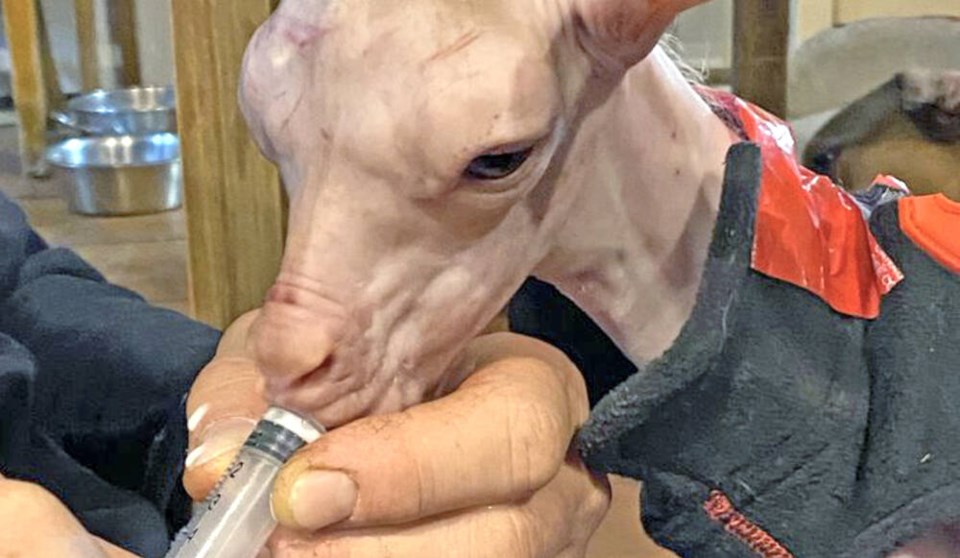SHAWINIGAN LAKE, B.C. — Conny Rohr is scrambling to care for a rare hairless baby goat born on her Shawnigan Lake area farm.
The kid, called Precious, has to be kept inside, requires constant feeding and needs clothes to keep her warm after being rejected by her mother immediately after being born Friday afternoon.
“We tried dog coats, but they don’t fit. I’m knitting her something, but she’s growing so fast I don’t know if I can keep up,” Rohr said.
Save for a few coarse hairs on her collar, Precious is completely hairless, which has baffled everyone at Rohr’s Maple Heart Ranch south of Shawnigan Lake, including their veterinarian who never heard of a goat born without hair.
In a strange twist, there was a similar case of a hairless goat born last month in Turkey, where a doe gave birth to twins — one that looked normal, the other one completely hairless, with jet-black, wrinkled skin.
Rohr said her partner, Gary Rogers, has been milking the mother and feeding little Precious with a syringe every two hours. They’ve also had to buy diapers and puppy mats as she’s living in the house, as well as heating pads and — going forward — special creams to protect her exposed skin.
Other than being hairless, Precious seems like any other newborn kid, Rohr said. On Monday, she was starting to jump up on the kitchen counter and furniture. She’s curious and exploring, but is being separated from the herd because the weather is simply too cold.
“We did not think she would survive, as her mom didn’t take her on,” she said. “But we tried anyway, as she seemed to have a very strong survival instinct.”
Precious is currently sleeping in a dog crate but will eventually need a special heated shelter and other ongoing care.
Angela Forster, president of the Vancouver Island Goat Association, a group of 26 breeders who provide information and education to goat owners, said she’s never heard of a hairless goat before and was shocked to hear about Precious.
She said the hairless phenomenon might have something to do with in-breeding or cross-breeding, or it could just be one of those freaks of nature. “But they will have to be careful with that little thing — keep it warm and get some sunscreen,” Forster said.
She said it’s a good thing the owners are milking the mother, and suggested eliminating the syringe and getting the kid on a bottle soon to build up the baby’s fat and strength.
Forster also said the owners can make quick clothing for Precious by modifying old sweaters, or even using a baby onesie.
Kids can start eating hay and grass within a few days after birth by watching their mothers, said Forster, but it can take longer without an example.
“I wouldn’t leave her out in the barn, but the baby could go out during the day,” she said.
She’s had a case of a mother initially rejecting her newborn, but Forster said she was persistent in helping the bond, which can sometimes take several days.
It’s not often that a mother rejects a kid, but when they do it’s usually because they associate the baby with the painful experience of giving birth, she said.
She’s urging the Shawnigan Lake family to reach out to members of the Vancouver Island Goat Association for support and advice.
Rohr said the extra care required by Precious has put a strain on their working farm, which contains wild boar piglets, chickens and horses. She’s also dealing with an injured collarbone, so her mobility is limited.
“We already have a very busy life and since my injury two weeks before I can’t do my regular chores,” she said. The homestead farm includes Rohr’s daughter and her partner, “so the work of four people is cut to three and now we have an extra high-maintenance task of caring for Precious 24 hours a day.
“It’s a lot like having a newborn baby,” she said. “She really needs attention all the time.”
Keeping the little kid warm also includes keeping their wood stove burning, and extra time running their generator, which the farm relies on for power.
Rohr has set up a fundraising page to assist in the ongoing care for Precious.
“We try to be as self sufficient as possible on our homestead, and be able to sustain our day-to-day bills to take care of all our animals in the best way possible, but now with the extra expenses and the limited workforce, we do need financial support,” she said.



